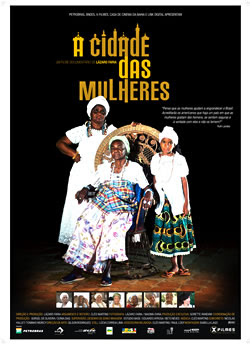A Cidade das Mulheres is a 72-minute documentary directed by Lázaro Faria that explores the Candomblé, an African derived religion that gave black Brazilian women power and a voice in a society where African descendants were discriminated against, excluded and devalued. Below are descriptions of the film. The first by the director himself, Faria, and the second taken from the Maria Preta website. Check out the film trailer below (with English subtitles).
In the late 1930s, American anthropologist Ruth Landes came to Brazil with the intention of studying race relations in Brazil. When trying to compare racism in Brazil and the United States she encountered two different realities, but no less exclusive. Blacks in Brazil were not only discriminated by skin color, they were kept in ignorance and misery. The poor remained devotees of the religion, Candomblé, which at that time was forbidden and persecuted. Returning to the United States, quietly expelled from the country for her studies of Candomblé, Landes launched the book Cidade das Mulheres (City of Women). She recounts with clarity and with some astonishment, the strength of a Baiana (Bahian) woman, this woman that invented in Brazil an unprecedented matriarchal system, developed around the cult to the orixás, where power is of the mother. Through the bonds with the saints the women went to the markets, took to the streets with their food and their exotic costumes, which enabled their economic freedom. Cidade das Mulheres honors the strength of this woman through Mãe (mother) Estela, Yalorixá (chief) of the Axe Opo Afonjá terreiro (house of worship), the greatest symbol of dignity and giving, a life devoted to her people. Her story, her philosophy and her legacy will be preserved through their testimonials. The main objective of this documentary is to show the power of these women, confirm the Bahian matriarchy with the affirmation that Bahia is the City of Women." - Lázaro Faria

"The documentary Cidade das Mulheres (The City of Women) is an absolute joy to watch. This documentary, directed by Lázaro Faria, it presents an intimate view of Mãe Stella de Oxossi who is perhaps the most influential figure in African religious traditions in Bahia. She is the head priestess from Axé Opó Afonjá founded in 1910, and which is one of the most important “terreiros” or African-Brazilian spiritual communities in Salvador, Bahia. In a gentle, yet self-assured manner Mãe Stella, who has always been ahead of her time, explains from a feminine perspective the history of Candomblé in Bahia, and the matriarchal system of power created and controlled by the women who practice these traditions. Mae Stella also reveals details from her own life story and how she was called to her position. A tribute to the many notable women who appear in the film, Cidade das Mulheres also pays tribute to Ruth Landes, the North-American anthropologist, who during the late nineteen-thirties, came to Bahia to conduct research and was surprised by the spiritual, cultural and economic power held by women in Candomblé. She published her findings – The City of Women in 1947. Her intimate thoughts and impressions are illustrated in this sensitive documentary by images of popular festivities which celebrate African spiritual traditions, and the stunning natural beauty of the city of Salvador. - MariaPreta.org.
Watch the trailer here (with English subtitles)

